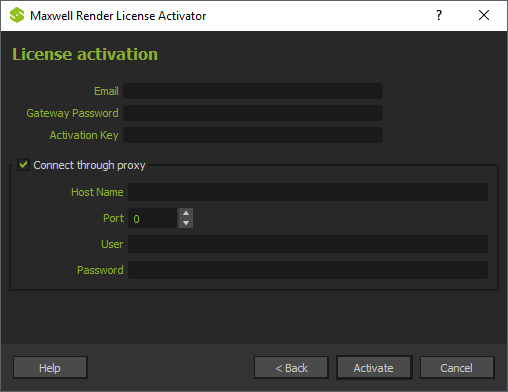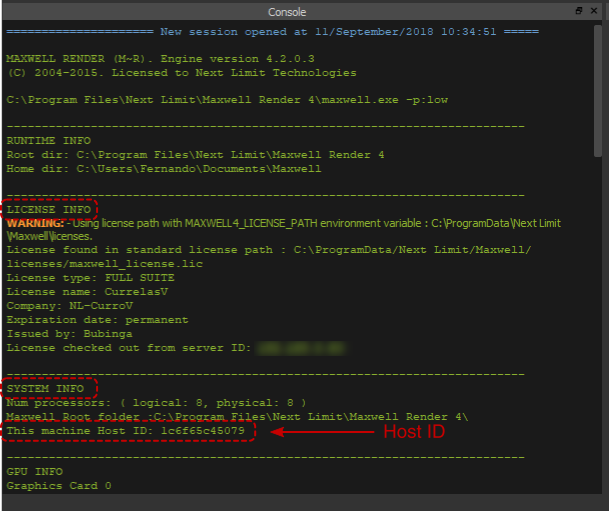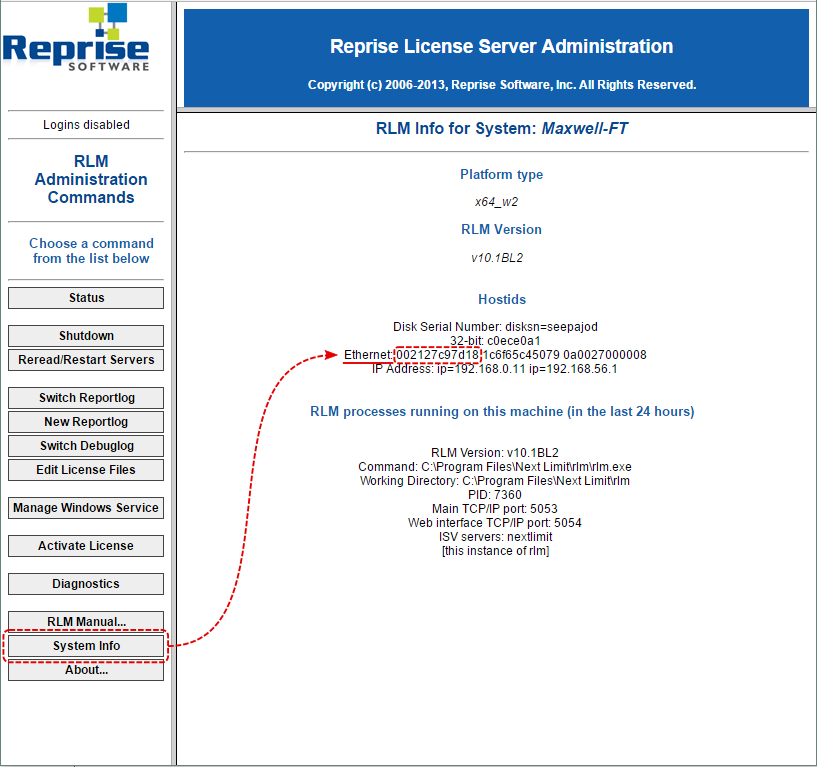- Created by Systems Next Limit (Unlicensed) , last modified by Next Limit on 16 Dec, 2024
You are viewing an old version of this page. View the current version.
Compare with Current View Page History
« Previous Version 27 Next »
General information
If the license activator pop-up appears when you launch Maxwell or Studio, this means there is an error with the licensing and you can find out what the error message is by looking in the Console panel in Maxwell Render. If the Console panel is not visible, go to Window from the top menu and make sure that "Console" is checked.
1.- "Connection error!" pop-up when trying to license Maxwell
Please make sure there are no Firewalls blocking access to maxwell.exe, licenseactivator.exe (from Maxwell installation folder) and/or rlm.exe (from Next Limit/rlm/ folder) applications and that you are connected to the internet.
In some cases, connection errors could appear if the connection is set through a proxy. In the License Activator application you will find the option for administrating proxy settings. If you have any questions about what to enter into the required fields, please contact your IT department.
This problem could also be temporary (our servers could be down for a short time for some reason), so maybe trying a bit later could solve the problem. If you try again and still are having the same problem, you can always activate the license manually from the Customer Portal. It can be done from My Products section; then set the Host ID using the orange button next to the license key and then use the green button to download the license file.
If you want to learn how to find the host ID, please take a look at this section, entry #7: Licensing Troubleshooting
You then have to copy it in one of these folders depending on your operating system:
Windows
C:\ProgramData\Next Limit\Maxwell\licenses\v5
OSX
For Floating licenses: /Users/Shared/NextLimit/rlm_nl/licenses
ForNode Locked licenses: /Users//Maxwell/v5
Linux
$HOME/Maxwell/v5 (in the Maxwell folder inside the user home folder)

Another option is that some security program in your computer is blocking the download of the license file. In this case, you will be able to find your license file in your account at the portal.
What you can do is download it manually and place it in the right folder. In order to do that, you can go to the portal (Next Limit - Portal ), get into your account, then go to My Products > Purchased / assigned products and locate a green button to the right of your product item. A zip will be downloaded to your computer; just unzip it and a .lic file will be extracted. Copy and paste it into one of these folders depending on your OS:
Node-locked licenses:
Windows: C:\ProgramData\Next Limit\Maxwell\licenses\v5
OSX: Users/<username>/Maxwell/v5
Linux: $HOME/Maxwell/v5
Floating licenses:
Windows: C:\ProgramData\Next Limit\Maxwell\licenses/v5
OSX: maxwell_product.lic: Users/Shared/NextLimit/rlm_nl/Licenses
Linux: $HOME/Maxwell/v5
Then restart Maxwell if needed and it should be licensed.
2.- "Communications error with license server" shows up in the Console panel in Maxwell.exe and the licensing pop up appears
This can generally mean a few things:
That the RLM License Server is not running. You can check if it's running by opening an internet browser window (on the computer where the RLM License Server is installed) and typing in the address: http://localhost:5054. If nothing appears then the RLM License Server is not running. Usually, a reboot fixes this problem as the server is made to start up with the computer.
If this computer is trying to connect to a license server running on another computer on your network, please check that any Firewalls or routers are not blocking communications for Maxwell and rlm executables.
You already had another RLM License Server running which is used by another application, and this server is already using port 5053. You can, in this case, change the port that Maxwell should use:
Locate the maxwell_suite_floating.lic file in the computer that's running the RLM License Server and open it in a text editor. For the location of this file, please see the Licensing page.
Edit the first line of the license to change the 5053 port to something else, such as 5055. Save and close the .lic file.
In case you also have a maxwell_license.lic file in this folder, open and edit the port nr in this file as well.
Reboot your computer for the RLM License Server to pick up the changes.
Now Maxwell should connect to the server using this new port.
You need to open the maxwell_license.lic file on all the computers that are running Maxwell and also edit the port nr in these files.
3.- I'm still getting the licensing pop-up, even though the licensing went fine and it saved my license file correctly
Solution 1: On some systems, we have noticed it's necessary to restart the computer in order for the RLM License Server to run properly. Please reboot your system and start Maxwell again.
Solution 2: It might happen that the RLM License Server needs to reread the license files. In order to do so open a web browser and type http://localhost:5054 in the navigation bar, you will see something like this:

If you see the message "NO ISV servers running" as in the image above it means that there are no licenses running in the license server. Go to the left panel, press the third button "Reread/Restart Servers" and then, in the center frame, press the "REREAD/RESTART" button.

Finally, press again "Status" in the left panel to check that there is an ISV server line with nextlimit as one of the active entries.

Solution 3 [mainly on OSX]: After trying Solution 2 and still getting "NO ISV servers running" and checking the firewall is not blocking the communications (in OSX go to System Preferences > Security and Privacy > Firewall to disable it), then it could be a hostname conflict.
In order to figure out if this is the case, just go to a terminal and type: hostname
And with whatever hostname you get, type: ping <what hostName returned>
If it returns:
a) cannot resolve hostname: Unknown host
Then you have a hostname conflict: the hostname you have configured is not good, and you must go to "System Preferences"->"Sharing". There under the "Computer Name" you will see a string that says:
"Computers on your local network can access your computer at: <computer_Name>.local"
So, go to Terminal and type: sudo scutil --set HostName <computer_Name>.local
After that, you can restart or go to re-read. It should work. If it doesn't work, we will need deeper information from your system so click on the button "Diagnostics" in the RLM interface (in the button area below "REREAD"). Please contact us and send us the file.
b) if, instead, you get something similar to:
PING myname.local (192.168.0.69): 56 data bytes 264 bytes from 192.168.0.69: icmp_seq=0 ttl=64 time=0.060 ms 364 bytes from 192.168.0.69: icmp_seq=1 ttl=64 time=0.073 ms 464 bytes from 192.168.0.69: icmp_seq=2 ttl=64 time=0.107 ms 5... 6(you should stop it with Ctrl+C)
In this case, we will also need the information in the Diagnostics button on the RLM interface (in the button area below "REREAD"). Please contact us and send us the file.
4.- "License could not be saved!" error"
Solution: This means the license activator does not have sufficient permissions to write the license file to disk. On Windows, please go to the Maxwell Render install folder (usually C:\Program Files\Next Limit\Maxwell Render 5), right-click the licenseactivator.exe application and choose "Run as Administrator". Then follow the licensing procedure as usual. In general, the license will need to be saved in:
Windows
C:/ProgramData/Next Limit/Maxwell/licenses/v5
OSX
/Users/<username>/Maxwell/v5 (node locked and Learning license)
/Users/Shared/NextLimit/rlm_nl/licenses (floating license)
Linux
$HOME/Maxwell/v5
5.- "Error getting license, returned code: Bad server hostname in license file"
This means the "maxwell_license.lic" file contains a computer name or IP that is wrong. In this case, find this .lic file on your computer and change the single line in it, to correctly mention the computer name or IP of the computer that's running the RLM License Manager. If this is the same computer, you're getting this error on, enter the computer name or IP of this computer.
For example, the line should say HOST 10.0.1.1 ANY 5053 (if 10.0.1.1 is the IP of the computer where RLM is running).
The location of this .lic file is:
On Windows: C:\ProgramData\Next Limit\Maxwell\licenses\v5
On OSX: /Users/Shared/NextLimit/rlm_nl/licenses
On Linux: $HOME/Maxwell/v5
6.- "My computers successfully connected to the RLM computer for some time, but now they suddenly can't connect to it anymore"
This could be due to a change in the local IPs of your LAN network, usually after rebooting your router. When you turn off and on your router, it assigns new DNS IP address numbers to all the computers in the LAN, so now the IPs are not the same as before.
In that case, simply find the new IP of the license server computer and repeat the license activation step (launch the License Activation pop up and choose the "Connect to the RLM License Server already running" option to enter the new server IP), OR directly find the maxwell_license.lic file that you will have in all your nodes, edit it with any text editor to update it with the new server IP and resave the license file.
7.- "I'm asked for the Host ID of my computer. How can I find it?"
The Host ID of a computer is a chain of alphanumerical characters (it should have no more, no less than 12 characters) that identifies a computer and is needed during the licensing procedure (both on Floating and Node-Locked licenses). It is actually the MAC address of the first ethernet card of the system.
The licensing system normally takes it automatically, but in case any problem occurs and you need to manually find this identifier, here are some methods:
Windows
You can go to the system Configuration panel > Network and Internet > click on the Properties button > scroll down to see its properties and copy the character after “Physical address (MAC)”.
Also, you check this using the CMD application:
Run the "Command" (cmd.exe) application.
Enter
ipconfig /all(if this does not work, please run cmd.exe as administrator)Copy down the "Physical Address" (aka "MAC address") from the first "Ethernet adapter Local Area Connection" (or "... Wireless Connection") section.
The hyphens between the two-digit blocks are not necessary.
All addresses shown here are examples and have to be replaced with your actual address!

MacOS
Open the "System Preferences" and go to "Network"
Select the first ethernet device in the list and click on More Options... > Hardware. If your machine doesn’t have an ethernet card, choose the Wi-Fi card.
Copy down the "MAC-Address" code for the licensing process.
The colons between the two-digit blocks are not necessary but can be used too.
All addresses shown here are examples and have to be replaced with your actual address!

In Maxwell Render (light green icon) the Host ID will show if you go to Help menu > License Info... A window will pop up with your license info and in the first line it will show the host ID

The host ID also appears displayed on the Maxwell Console panel, near the top, on the System Info section, as it is indicated in the screenshot below:

If you only have the RLM server installed in the machine and no other Maxwell software, you can find the Host ID of your machine by looking at the RLM administration web page. You can get to it by typing localhost:5054 in a web browser. If the RLM is running you will see something very similar to the image below. Click on System Info. The Host ID of your machine will be the first twelve characters group after "Ethernet".

8.- "Maxwell gets licensed and is running properly, but then it appears again unlicensed after each reboot of the computer"
Certain network drivers are specifically configured to change the Mac Address of a computer on each reboot. This causes that, while you can successfully license Maxwell for that computer, next time you reboot that computer, its Mac Address (an internal identifier) has changed, so that computer is not recognized by the license system and Maxwell appears unlicensed, forcing you to re-license it again, that will only work until your next reboot.
The way to solve this is by forcing your network adapter to not change the Mac Address to a different one to keep it constant.
On Windows, you can do it by forcing the order that Windows sees the available adapters so a hardware adapter is always the first in the list. Maxwell will get that one and then the licensing will remain stable. To do it in Windows:
1.- Go to: Control Panel>Network and Sharing Center
2.- Click Change Adapter Settings
3.- Right-click on a non-virtual adapter and choose Properties
4.- Select IPV4 from the list and then click Properties
5.- Click Advanced...
6.- In the IP Settings tab, uncheck Automatic Metric at the bottom of the pane
7.- Type in the number '1' in the Interface Metric box
8.- Click OK to back out of the chain of dialogs
To confirm this has worked, you can open a command prompt and type in ipconfig /all and you should see that adapter listed first in the output. This will now be the adapter that Maxwell picks up on and you can license against it.
9.- "XXXXXX cannot be opened because it is from an unidentified developer"
Go to System preferences > Security to change the settings for running applications in your system, and allowMaxwell, or the RLM License Server in case you are installing the licensing server. After they have been installed you can put the security settings to default.
10.- "Unable to create ISV socket, comm error: -216,errno: 1"
In general terms, there are two possibilities for getting it blocked, in this most possible order:
1.- There could be a firewall running, if so, it should be disconnected: going to "System Preferences" -> "Security and Privacy" -> "Firewall"
2.- If not, you could have a HostName problem. In order to figure out if this is the case, just go to a Terminal and type: hostname
And with whatever hostname you get, then type: ping <what hostName it returned>
If it returns:
a) cannot resolve hostname: Unknown host
Then you have a hostname conflict: the hostname you have configured is not good, and you must go to "System Preferences"->"Sharing". There, under "Computer Name", you will see a string that says:
"Computers on your local network can access your computer at:
<computer_Name>.local"
So, go to Terminal and type: sudo scutil --set HostName <computer_Name>.local
After that, you can restart or go to re-read. It should work. If it doesn't work, we will need deeper information from your system so click on the button "Diagnostics" in the RLM UI, (in the button area below "Reread Restart Servers") and send the diagnose file to our Technical Support for a further exam.
b) if you get something similar to:
PING myname.local (192.168.0.69): 56 data bytes
64 bytes from 192.168.0.69: icmp_seq=0 ttl=64 time=0.060 ms
64 bytes from 192.168.0.69: icmp_seq=1 ttl=64 time=0.073 ms
64 bytes from 192.168.0.69: icmp_seq=2 ttl=64 time=0.107 ms
...
(you can stop it with Ctrl+C)
In this case, contact our Technical Support and send us the information in the Diagnostics button on the RLM UI, (in the button area below "Reread Restart Servers") and send us the file.
A bit more information about how OSX handles hostnames can be found in websites like this.
11.- "The RLM license server does not launch at boot time in MacOS"
If after installing the RLM License Server and activating the licenses you find that, when you boot again your machine, the RLM does not get launched (it doesn't show in Activity Monitor as "rlm") you might be having some permissions problem in that account.
To solve it try entering this in a Terminal (you will be asked for an administrator password):
sudo chown root /Library/LaunchDaemons/com.nextlimit.maxwellrlm.plist
sudo chmod 644 /Library/LaunchDaemons/com.nextlimit.maxwellrlm.plist
If that doesn't work, please navigate to /Library/LaunchDaemons/ and copy the file com.nextlimit.maxwellrlm.plist
Then navigate to /Library/LaunchAgents/ and paste it there
You can test if it works after logging out and in again. The RLM should show in Activity Monitor and should be reachable by typing in a browser localhost:5054
12.- "After trying licensing on a Windows computer the License Activator and Maxwell Render closes down without completing the licensing process"
In this case, please, check if the material editor (MXED, purple icon) also closes down immediately.
If it does, please, follow these instructions to solve it:
Go to the Maxwell installation folder (C:\Program Files\Next Limit\Maxwell Render 5) and locate the libeay32.dll file.
Rename it to libeay32.dll00 (we are disabling it by doing this).
Unzip it and copy the new libeay32.dll file into the Maxwell installation folder.
Maxwell should now open fine.
This issue also affects the License Activator. After replacing the file, the licensing problem should disappear.
- No labels